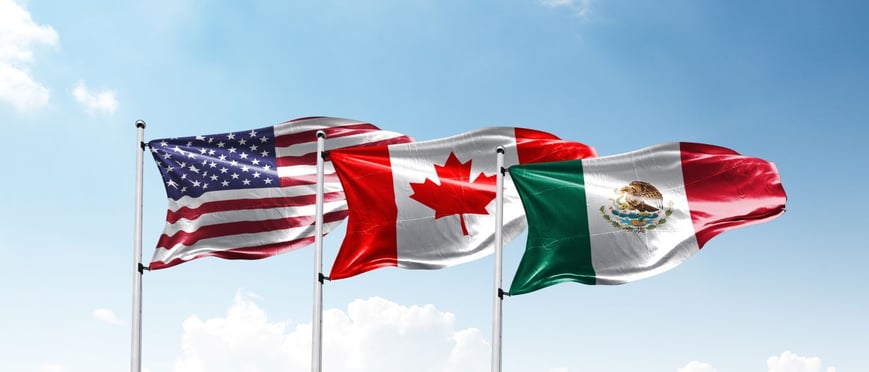
In March 2025, the U.S. imposed a 25% tariff on certain goods from Canada and Mexico under the International Emergency Economic Powers Act (IEEPA), targeting efforts to disrupt the supply chain for fentanyl and related precursors. For importers, these duties are not just a regulatory development; they are a direct financial hit. Businesses already facing traditional customs duties now need to absorb another layer of cost that could significantly affect pricing, planning, and profitability.
But there is a potential solution: the United States-Mexico-Canada Agreement (USMCA).
The Solution: USMCA
By leveraging USMCA, businesses can save a significant amount on their import costs, thereby mitigating the financial impact of the IEEPA tariffs.
When correctly applied, USMCA offers preferential duty treatment that can eliminate not only standard tariffs but also IEEPA’s 25% duties, assuming the goods qualify. However, unlocking these savings requires more than just referencing the agreement. It demands strict compliance with rules of origin and proper certification.
Rules of Origin: A Critical Step
To benefit from USMCA, goods must originate in North America according to specific criteria outlined in the agreement. This does not simply mean the product was manufactured in the region. It must meet detailed origin requirements that vary by product, often based on tariff shift rules, regional value content, or specific processing thresholds.
Understanding and applying these rules requires:
- Detailed product knowledge, including material composition and production processes
- Accurate classification using the Harmonized Tariff Schedule
- Thorough documentation to support the origin determination
Any errors in this step can invalidate the claim, resulting in back duties, penalties, and potential delays in your supply chain.
Certification: Documentation That Matters
Claiming USMCA benefits also requires a valid certificate of origin. Unlike previous trade agreements, USMCA does not require a specific form. Instead, it mandates a set of minimum data elements that exporters, producers, or importers must provide.
These must be:
- Complete, including all required elements
- Accurate, since misstatements can lead to fines and repayment of duties
- Available upon request, with documents retained for at least five years
For companies with complex or multi-tiered supply chains, collecting this documentation from suppliers across North America can be time-consuming and challenging.
How Tradewin Can Help
At Tradewin, we help companies navigate both the rules of origin and certification requirements with confidence. Our team provides:
- Origin determinations that align with USMCA’s legal standards
- Supplier outreach and certificate solicitation to collect, review, and manage documentation
- Training programs for your vendors and internal teams to support long-term compliance
- Strategic guidance on integrating USMCA into your broader duty mitigation strategy
- Our FTANavigator platform helps automate document solicitation and streamlines supplier communication for efficient certificate collection.
With increased enforcement and the high cost of non-compliance, the opportunity to reduce or avoid the IEEPA tariffs through USMCA is significant. However, it is only available to those who follow the rules carefully and document every step. Compliance is a necessity for businesses looking to navigate the impact of these tariffs.
Take Action Before the Next Shipment
If your business imports from Canada or Mexico and has been affected by the recent IEEPA tariffs, the USMCA provides a powerful opportunity for cost savings. To take advantage of it, you must act quickly and ensure compliance from start to finish. The sooner you act, the sooner you can start benefiting from the potential cost savings.
Tradewin is here to help you determine eligibility, secure the required certifications, and build a compliance program that protects your business. Contact us today to learn more.




